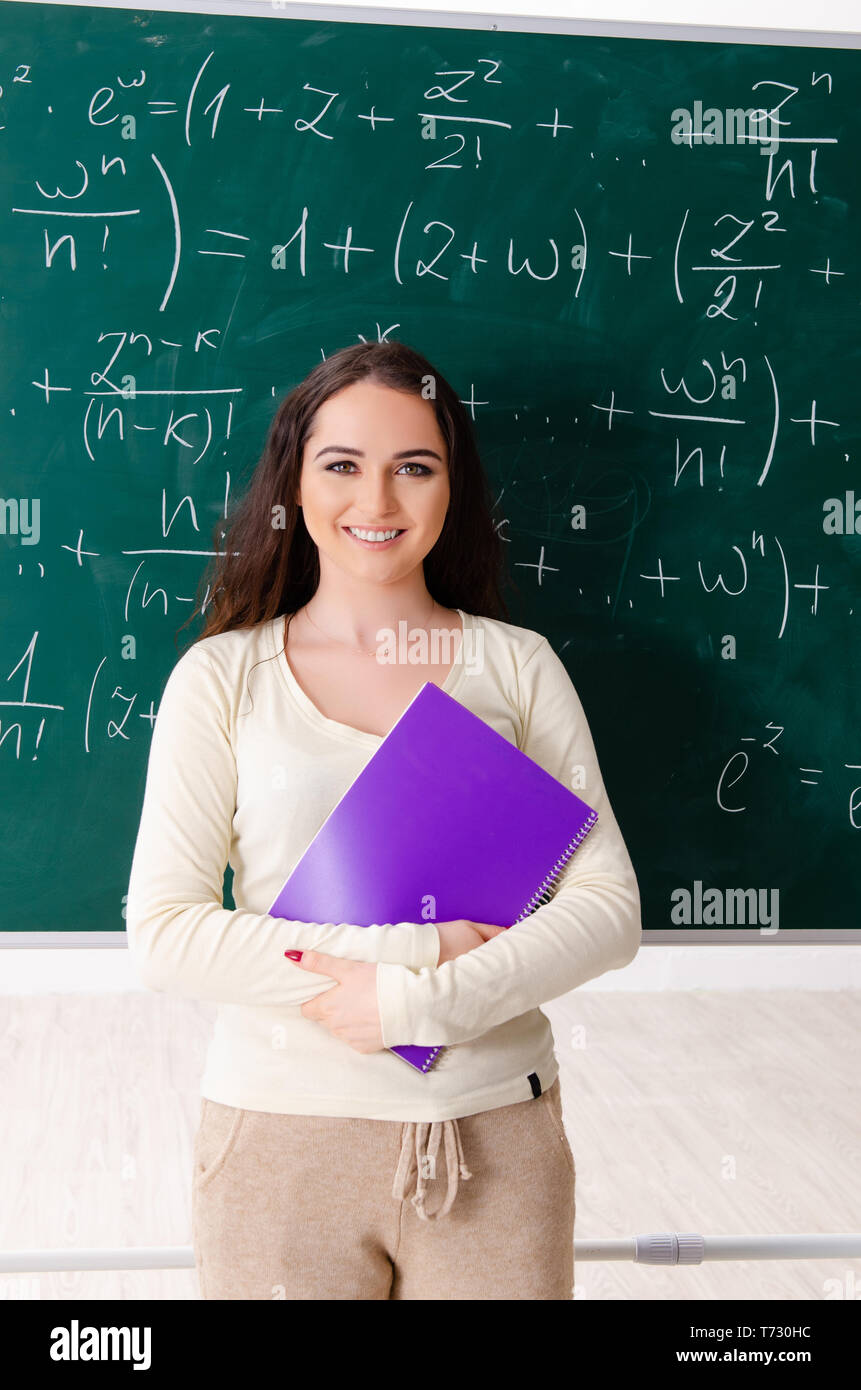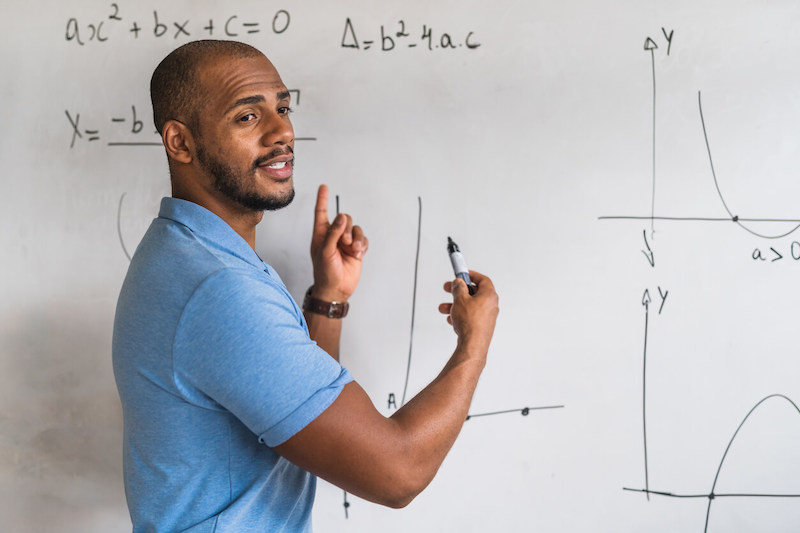How experienced math teachers stay updated on mathematics research
Wiki Article
Accomplishing Enterprise Excellence: Recognizing Sector Standards and Strategic Leadership for Mathematics Faculty
Accomplishing enterprise excellence in maths education demands a careful evaluation of industry standards and the duty of tactical leadership. Mathematics faculty have to recognize exactly how these standards form curriculum and mentor methods. Furthermore, effective management can drive collaboration and professional development among instructors. This complex strategy increases concerns regarding the functional effects for trainees' career readiness. What methods can faculty take on to connect the space between education and industry needs?The Value of Market Standards in Mathematics Education
In the domain name of mathematics education, sticking to industry requirements is necessary for guaranteeing that programs effectively prepare students for real-world applications. Sector requirements provide a framework that straightens educational results with the skills called for in numerous careers. By including these standards, math programs can boost their importance and rigor, consequently boosting student engagement and discovering end results.
Strategic Leadership: Specifying Duties and Duties
Effective calculated management within maths professors requires a clear interpretation of responsibilities and functions to assure ideal operating and placement with institutional goals. Leadership structures must be developed to delineate jobs among professors members, administrators, and support personnel, making certain that each individual comprehends their payments toward collective goals. Faculty leaders ought to cultivate an environment that advertises cooperation and accountability, enabling staff member to involve effectively in educational program growth and assessment procedures.Strategic leaders have to prioritize continuous specialist advancement, making sure that professors members are fully equipped to meet the evolving demands of maths education and learning. This entails not only straightening private roles with institutional concerns but also promoting a culture of constant enhancement and technology. By clearly specifying roles, calculated leadership can improve interaction, improve decision-making procedures, and ultimately add to a much more natural and effective mathematics professors, positioned to satisfy the difficulties of modern education and learning.
Ideal Practices for Enhancing Mentor and Understanding
In the quest of enhancing teaching and learning, math professors can take advantage of innovative teaching methods that engage trainees effectively. Implementing collaborative knowing atmospheres promotes synergy and essential reasoning abilities amongst learners. These finest techniques are necessary for creating a dynamic academic experience that promotes much deeper understanding of mathematical concepts.Innovative Training Methods
While conventional techniques of teaching have their place, ingenious teaching approaches are vital for boosting engagement and understanding among mathematics faculty and their pupils. Methods such as turned class and problem-based understanding motivate active engagement, allowing pupils to take ownership of their learning. Incorporating modern technology, such as interactive simulations and online collaboration devices, better supports diverse knowing designs and cultivates critical thinking. Furthermore, making use of real-world applications in lessons aids trainees connect mathematical ideas to daily life, making the subject much more appealing and pertinent. Professors participants who accept these approaches can create a dynamic knowing environment that not just boosts comprehension yet additionally influences a long-lasting passion for mathematics. Taking on innovative approaches inevitably leads to greater levels of student success.
Collaborative Discovering Atmospheres
Structure on the innovative mentor strategies previously talked about, collaborative understanding environments play a pivotal function in improving the educational experience for mathematics professors and their pupils. These environments urge active involvement and foster a feeling of community, enabling pupils to gain from each other and develop important believing abilities. Finest practices consist of organized group work, peer tutoring, and project-based understanding, which advertise collaboration and shared duty for learning end results. Professors must help with discussions and offer support while allowing trainees to discover concepts collectively. In addition, integrating innovation can enhance partnership by supplying platforms for interaction and resource sharing. Inevitably, collective understanding settings equip trainees to take ownership of their education and grow a deeper understanding of mathematical principles with teamwork and communication.
Straightening Faculty Goals With Institutional Purposes
Straightening professors goals with institutional advice purposes is essential for fostering a cohesive instructional environment that enhances both training efficiency and trainee success. When professor comprehend and embrace the wider objective of their establishment, their training methods can be tailored to sustain these purposes. This alignment ensures that faculty are not only satisfying department assumptions however also adding to the overarching goals of the institution, such as boosting pupil involvement and scholastic performance.To accomplish this alignment, regular communication between faculty and management is crucial. Workshops and collective meetings can facilitate conversations on institutional top priorities and exactly how faculty can integrate these right into their educational program. Additionally, efficiency assessments can be designed to mirror these straightened objectives, urging professors to innovate in their training techniques. Eventually, when faculty goals resonate with institutional purposes, they cultivate an extra unified method to education and learning, benefiting both pupils and educators alike.
Cultivating a Culture of Continual Enhancement
Cultivating a society of continuous improvement within maths professors is necessary for enhancing both instructional high quality and pupil outcomes. This includes producing an environment where faculty members are encouraged to frequently examine their mentor practices and look for comments. Expert growth chances need to be readily available, enabling instructors to discover brand-new pedagogical approaches and incorporate evidence-based methods right into their educational program.Cooperation amongst professors is crucial; sharing experiences and understandings can lead to innovative remedies and boosted teaching approaches. Establishments should execute systematic evaluation processes, allowing professors to review their performance and identify areas for growth.
Acknowledging and commemorating success, no matter how little, enhances the commitment to renovation. By embedding constant renovation right into the faculty culture, mathematics divisions can improve their general performance, inevitably profiting both educators and students in the quest of scholastic quality.
Cutting-edge Approaches to Mathematics Program Advancement
Many ingenious methods can transform mathematics program growth, making it much more receptive to the evolving instructional landscape. experienced math teachers. One reliable approach entails incorporating technology, such as on the internet knowing platforms and interactive software application, to boost pupil involvement and ease of access. This shift permits for a blended knowing atmosphere, catering to varied understanding designsMoreover, taking on a project-based learning framework encourages collaborative analytical and real-world application of mathematical concepts. Faculty can additionally emphasize interdisciplinary links, illustrating exactly how mathematics converges with fields like science, art, and engineering, promoting a more Visit Website all natural academic experience.
Routine comments from students and sector stakeholders can lead curriculum modifications, making certain importance and roughness. Furthermore, providing expert advancement opportunities for professors can advertise ingenious mentor techniques and maintain educators educated of the most up to date trends. Via these strategies, mathematics programs can grow a dynamic learning atmosphere that prepares pupils for future difficulties and professions.
Regularly Asked Questions
How Can Faculty Gauge the Influence of Market Standards on Student Outcomes?
Professors can determine the impact of industry criteria on trainee outcomes by examining analysis outcomes, tracking employment prices, obtaining employer feedback, and performing longitudinal studies to contrast trainee efficiency before and after implementing the standards.What Resources Are Available for Expert Development in Mathematics Education?
Many resources for specialist advancement in maths education and learning consist of online training courses, workshops, webinars, specialist companies, conferences, and peer collaboration possibilities. These platforms help with ability enhancement, innovative mentor techniques, and efficient assimilation of modern technology right into mathematics instruction.Just How Do Industry Standards Vary Across Different Geographical Regions?
Market requirements differ significantly across geographical areas as a result of elements like governmental regulations, educational priorities, and cultural influences. These inconsistencies can influence curriculum advancement, training techniques, and the implementation of evaluation techniques in mathematics education and learning.What Duty Does Technology Play in Getting Venture Excellence in Mathematics?
Innovation enhances venture quality in mathematics by improving processes, allowing data evaluation, promoting cooperation, and supplying accessibility to resources. It empowers trainees and educators alike, promoting innovative training methods and boosting total academic results in the field.Exactly How Can Professors Properly Work Together With Market Allies?

In the pursuit of enhancing training and understanding, math faculty can benefit from innovative training strategies that involve students effectively. While standard approaches of teaching have their area, cutting-edge mentor methods are crucial for enhancing interaction and understanding among mathematics professors and their pupils. Structure on the ingenious teaching strategies formerly discussed, joint learning settings play a critical role in enhancing the academic experience for mathematics professors and their pupils. Lining up faculty objectives with institutional goals is vital for fostering a natural instructional atmosphere that boosts both teaching performance and student success. Promoting a culture of continuous renovation within mathematics faculty is essential for improving both educational top quality and pupil end results.
Report this wiki page